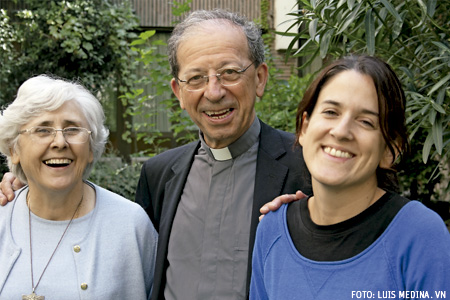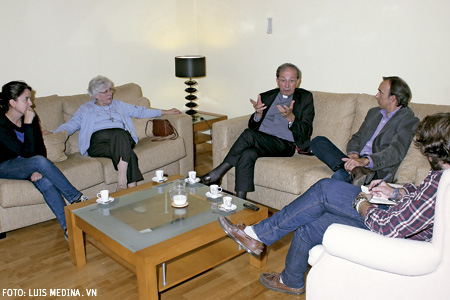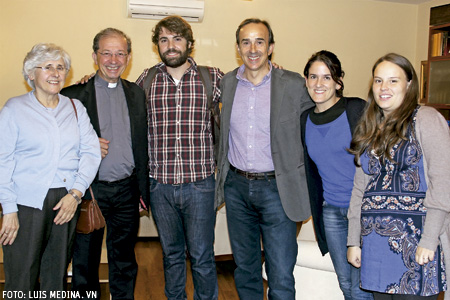‘Vida Nueva Encounters’ addresses the challenges the Church is facing in this field
 Magdalena, Anastasio and Carmen, ‘spokesmen’ of missionaries for Vida Nueva (Spanish magazine).
Magdalena, Anastasio and Carmen, ‘spokesmen’ of missionaries for Vida Nueva (Spanish magazine).
FRAN OTERO. Photos: LUIS MEDINA |
You may be wondering, if you have not heard already, what it means # YoSoyDomund. You will not be the only one, also bishops have asked. The answer is simple: it is the campaign that in twitterers language has launched PMS-Spain to make us aware that we are all part of the World Mission Day, a day-this year is celebrated on October 20, which was described by the emeritus Pope Benedict XVI as a “new Pentecost”.
And Vida Nueva, in its commitment to the mission and the missionaries, has decided to join the campaign through a new edition of the Vida Nueva Encounters as said its editor, José Lorenzo, at the opening of the dialogue: “From Vida Nueva, we have always followed with great interest the mission. It is a very important testimony to the world of today and you will always find us to help you in this task so necessary. ”
Attended the national director of the Pontifical Mission Societies, Anastasio Gil (AG), the Comboni Missionary Sister with 35 years of missionary work in Chad Magdalena Rivas (MR) and Carmen Aranda (CA), a young Comboni Lay Missionary, who will go to Republic Central next year.
QUESTION. – How do you live the mission?
AG. – From my dedication, almost “professional”, I am discovering the depth of faith, humanity and generosity in each of the missionaries. I have not found any unbecoming me from this. The missionaries, regardless of age, are young people because they have nothing to carry in their backpack, do not question why go to one place or another. Furthermore, when they are in the mission they are quiet people, calm, showing the patience of God. They know well the grass grows at night.
MR. – I think you idealize us too much, because we are human, poor, small… and many times we have a mission so great that it absorbs us. When I left in 1977 to Chad, I thought I had to eat the world. Always worked in the field of health: there I taught the most basic things, such as washing hands or filtering the water, and also directed a hospital of 130 beds. I have worked in villages, under a tree, in a shed, with malnourished children, polio. It is a path where you grow, but also discover and feel yourself smaller and smaller. I didn´t catechesis ever, but I felt one hundred percent missionary healing in the hospital. Trying to be the little shadow of God that pass and leave some love, in a country in permanent conflict and in a situation of extreme poverty.
CA. – For me, mission is life capitalized. I was three months in Ethiopia and I felt God called me there to meet me. Back, Africa came out everywhere. So I left my job, my car and my house. I could do nothing, because what He is offering is something much better. I needed God to be my priority, and I made it in Africa. It was a very lovely call to be with the last. God does it very well: He cares you, pampers you and tells you the things you feel. In my case, there haven´t been resignations and, in this sense, it has been very easy.
MR. – Living in mission is easy and very difficult. It’s easy if you have a vocation and if you find your place. No matter what you do, because you will be happy. And it’s terribly difficult, because you have no means and you attend extremes situations. But we can live because there are people in Spain, Italy or France to pray for us, support us, sustains us. Yes, I cried a lot.
CA. – I also had a horrible time the last month in Ethiopia…
MR. – I cried a lot. You feel depressed, destroyed. For example, Saint Joseph Hospital, the only one in southern Chad and where I worked, is about to close because we have no funds. You feel tiny, poor and that you cannot do what you should. Providence has made that many doctors who come from Spain have fallen in love with it and have organized campaigns and parties to raise funds.
Q. – What is the Domund for you? How do you live it from each of your realities?
MR. – In Chad we live in the same way. We held a vigil, pray and make a collect, because the poor can give from their poverty to help others, and can pray for other poor. We live the Domund with depth, are great days for us. In short, is living for the other, with the other getting on their skin. Another thing is that we need resources and support, as we have not learned to live on air. We have needs, but I think we should give more strength to the spiritual part of Mission Sunday, to that union. To me has really been helpful to never give up, and achieve to hold at my parish a Mass for the missionaries in danger. I said: “I cannot stand, but I cannot give up.”
AG. – There is an Ecclesial communion, of spirit, of prayer and family. For obvious reasons, we glide to identify the Domund with an economic cooperation, but is a consequence of spiritual cooperation. We have to open the horizon and see what happens in other countries. The Domund is the best expression of the universality of the Church. The October 20 we are going pray in all churches for the people who have received the missionary vocation, we will feel in solidarity with them. Economic cooperation is essential, but not the most important. The Mission Sunday is the feast of the universality of the Church, “the new Pentecost,” Benedict XVI said.
CA. – People who are suffering are our brothers and I cannot turn my back. The Domund connects us all and reminds us that we all, as Christians, are responsible for our brothers. I want to feel that those who live in other parts of the world are my brothers. I’m leaving soon to the mission and our formers are telling us to dismantle everything, not to be overwhelmed at the place of destination. I was born in a wonderful family and that’s free. I hope that I can use all my personal knowledge there, knowing that they have many things to offer. As Pope Francisco says, I will take Jesus Christ.
MR. – On one occasion, in the hospital, I was trying to encourage a man who had a child there with meningitis, a disease from which he had already lost two others, and with his wife pregnant. I told him that God would deliver him from this suffering, because God is a Father. He said, “God is the father of whites. My children had died because we have no hospital nearby; those that I have at home have to walk 15 kilometers to go to school without breakfast… You have hospitals, schools, doctors and medicines. You can call God father “. You feel so tiny that you do not know what you have to answer. I say I am the broom behind the door that people are going to look when they need it. It is not in a visible place, but it is always. Long before the missionaries were the protagonists, now it is the native clergy which has to be strong. Missionaries today must be the ones that hold the native and retired as the broom. Because of the war, I have had to sign three times in the embassy renouncing to leave the country under my responsibility. I cannot be a mercenary, in a situation of danger they leaves. I share the risk with them.
“I am finding the depth of faith,
humanity and generosity
in each of the missionaries.
I have not found any
I unbecoming of this. “
Anastasio Gil, director of PMS Spain.
Q. – Does your life change?
MR. – For young people who came to Chad, life changed completely. A childhood friend, after making an experience with me in 1996, left her job and a significant salary to work for much less at Caritas. Also I have to say that after many years away, it is very difficult to live here. It’s another life, everything is different.
AG. – When you go to the mission also realizes your radical weakness. Do not know how to eat, speak, move… That´s why we have to train ourselves to be the broom behind the door. And when you get back there are some problems, one of the most important is the lack of social coverage for religious and laity. Getting back, you have nothing.
MR. – We must find a solution to that problem. A sister came from Africa with Dengue and had to be entered 20 days in a hospital. Now we have to pay the bill because she has no right for health care.
AG. – Spain does not have, like other countries, a law for international volunteering. Moreover, the missionaries were excluded from the Statute of cooperators for ideological reasons. Right now there are economic problems, juridical and a legal vacuum.
“I have never done catechesis
but I have felt a hundred percent missionary
healing in the hospital.
Trying to be the little shadow
from God, Who pass and leaves a little love
in a country in permanent conflict
and in extreme poverty. “
Magdalena Rivas, Comboni Sister, 35 in Chad.
Q. – How do you see the future of the mission?
AG. – I really like that hopeful idea of John Paul II in Redemptoris Missio that we are facing a spring. The future of the mission is full of hope and vitality. There are many clouds that obscure the view, but the vitality of the churches in formation is so big and so strong that in the immediate future will be booming. The data always give a true foundation: the Church has grown in the last 30 years by 150% in Africa, 50% in America, 30% in Asia, 11% in Oceania and 5% in Europe. These data come in handy for us to realize that Europeans are not the navel of the universe. We must take off the beret and think that the future of the Church passes through these mission territories. It is also true that the Spanish missionaries, for example, have an advanced age, but we had to realize that from the mission territories are emerging many vocations. In Vietnam, for example. The only danger I see is the perception that the mission is here, the new evangelization, and that we get closed in ourselves. The problems have existed since man exists. We must be universal and not stem the tide. The missionaries are now coming from the south: Vietnam, Laos, India, Brazil, Colombia, Nigeria…
MR. – In Chad there are Japanese, Polish, Vietnamese, Indians, Mexicans, Colombians… And in my community, that we are six, there is a Ugandan, one Ethiopian, one Mexican, one Spanish and two Italian. Moreover, young people in Africa cannot enter the seminary until finish those inside, because there are no resources to support them all. If we were aware of all that goes into this, we would share in a different manner; the Domund will not be only once a year. We don´t live it as our own, and they are our brothers.
AG. – This is important, because we may think we are the center of the world.
CA. – I aspire that the mission become also a source, that we receive from the other territories many thing that we have lost here, that they make mission here. Europe is not the center. Among other things, return to the family, as a space for the growth of children, so they can be capable of anything. Cooperation is not only secure food and health; it is to ensure a quality of life. And in this, they have a lot to say.
MR. – In Africa they give much value to life. In fact, when a person dies, it doesn´t highlights the heritage but the children, grandchildren and great grandchildren who leaves.
“I aspire that the mission become also a source,
that we receive from the other territories
many things that we have lost here,
that they make mission here.
Europe is not the center “.
Carmen Aranda, Comboni Lay Missionary, next year to Central African Republic.
Q. – Returning to vocations, how you perceive the situation from here?
CA. – Other models should be promoted among children. Today, society shows the Christian as persons who does not know how to live, as a simpleton. That is not so. We should propose another model for the child to choose.
MR. – Many people do not have the courage to cut the umbilical cord. It is more difficult today, because of the lower number of children.
AG. – From the PMS we conducted meetings with young people who have lived or are living a temporary experience in the mission. Throughout the year but especially in the summer, there are about 10,000 young people living a missionary experience. They discover the figure of the missionary, the gratitude with which they settle and eventually interpellate. This is what is raising today. Vocations are not as numerous as 30 years ago, but they emerge. For example, now appear in the laity, with the same commitment than a sister or a priest. The laity has its uniqueness and particularity. Go to the mission as a layman or laywoman, not as a second division priest or as an auxiliary. They go with their own laity responsibility. They must have a professional job, volunteer, unpaid, ensuring its sustainability, and missionary, that is the adjective that qualifies the noun. They are not cooperators; they go to build the Kingdom of God. In this context, there are emerging vocations and we are very satisfied.
Q. – What can bring Francisco to the mission?
AG. – Pope Francisco speaks a lot about the mission. There are two important documents: one on 17 May to the national directors of the PMS, and the message for Mission Sunday. In addition, the week from14 to 18 of October he decided to invite to the daily Eucharist in Santa Marta the groups working in Propaganda Fidei. From his words, I call attention to two things: missionary activity is the paradigm of any pastoral activity, that is, has reference to the missionaries, and missionary commitment is not optional, but something that is the essence of being a Christian.
CA. – I liked when he said that the Church is not an NGO and the idea that, following Jesus, otherwise spare. That is, you are richer the more able you are to impoverish.
MR. – Just the simplicity and gestures invite us to shed our environments and go toward the poor and the needy. He, who comes from mission territories, feels it, he has lived and grown up with it.
With Francisco concluded an open and honest dialogue, a dialogue that puts the Domund face, a face that is present and future. Jose Lorenzo lock the meeting: “We give you the thanks. Your testimonies are very eloquent. In this field, you are at the forefront, offering a revitalizing example”.
In No. 2,867 of Vida Nueva.





